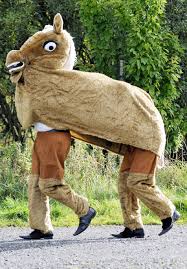
This list of thoughts/talking points was developed for a run of Improv Conspiracy shows featuring many new Duo teams. Although this could just as easily apply to any small cast Improv shows. Please treat these as talking points for your team, that you can use to develop a shared language for being inspired and connected in your show:
- Editing – Because you will often have everyone on-stage, it can be difficult to clearly transition, edit, tag etc. Here are some options:
- If the space allows, you may be able to do sweep edits (where one player jogs across the front of stage, acting like a curtain closing to indicate a scene change). These are the least theatrical option, and although they may offend the upper-class, they are a good solution if you ever find yourself confused, or just need to edit immediately.
- Wing-walk edits are where a player drops their character and walks to the wings, their scene partners can follow suit, indicating a change of scene. (For ghosting and/or adding new characters into scenes, read below.)
- Physicality edits are where an improviser adopts a whole new character physicality and voice mid-scene, indicating they have jumped to a new time/location. This one can take some training to get all players on the same page, but can be exhilarating to watch.
- Vocal edits are where you use any type of vocal effect to move the stage through time/space. This is everything from “Remember that time when dot dot dot”, and then you take a new position and show us that moment. Through to announcing “We cut to the moment when dot dot dot”, the latter requiring the least amount of training/finesse, but effective none the less.
- You can simplify all of this by playing the whole show (semi) real-time (ala TJ and Dave). This could be a mono-scene set in one location, or a show that follows a set of characters as they navigate the world.
- Often Duo’s feel trapped in their first character choices, and get stuck there. Unless you’ve specifically chosen to do a mono-scene or real-time show, don’t feel trapped.
- Do not be afraid to extend the playing area off the stage, maybe the on-stage space is a laundry, then the middle-aisle of the theatre could be the hallway to it, or the wings might be an adjoining rumpus room. Lots of opportunity for inspiration there.
- Editing Style – Whereas a sloppy edit in a 10 person cast looks lazy, in a duo it can create confusion. Be confident in what you do here, talk about it before hand and play.
- Character Clarity – Because two of you are playing (potentially) many characters, it can be difficult to differentiate between them if they all have a single physicality/voice (especially if its your own). I’m not saying you should play more broadly or hammy with your characters, but you should be precise. All the specificity you breathe into your characters then become opportunities to edit/transition inside of the show.
- Character Transience – Because you are doing so much, you can have situations where your characters blend. Try to make them clear physically, this will help, and if a mistake is made just play it as true, don’t fall into 4th wall breaking for a quick gag. Take this moment as the new truth, and move forward. Yes, you might need to use a bit of dialogue to clarify some aspect, but don’t dwell on it. We want scenes, not negotiation.
- Scale – We can have challenges where we are all on stage and need another character. Ghosting (aka shifting) between multiple characters in a scene is an option. Make the transitions clear between each character, do not melt between characters, have a clear separation between “I am Mary the Milkmaid” *drop character and move to location of new character* *assume character physicality* “I am Jackie the Farmer”. Whereas an edit would look like you jogging off stage to clear, a ghost move, or walk-on in a duo show should look like a shadow moving to a new position.
- Ideation – Because we are often all on stage at the same time, how do we come up with new ideas while we are also trying to do the current scene!? You can always just make a choice to do something specifically different to the last scene, in terms of stage picture, character, tone, volume etc. These are all opportunities to be inspired. Also don’t be afraid to take a word, or line, or object, or anything and use that as inspiration for a new who, what or where.
- Fun – Duo work can be a lot of fun, remember that is why you are doing this. Keep it fun, play and enjoy the challenges of the cast constraint. Don’t worry if there are moments where you and your scene partner need to get on the same page, that’s part of the fun. Also do not use these are any other guidance as a weapon to hurt each other with, these are just guidelines to help you remain connected.
Have fun you dynamic duo’s!
Leave a Reply